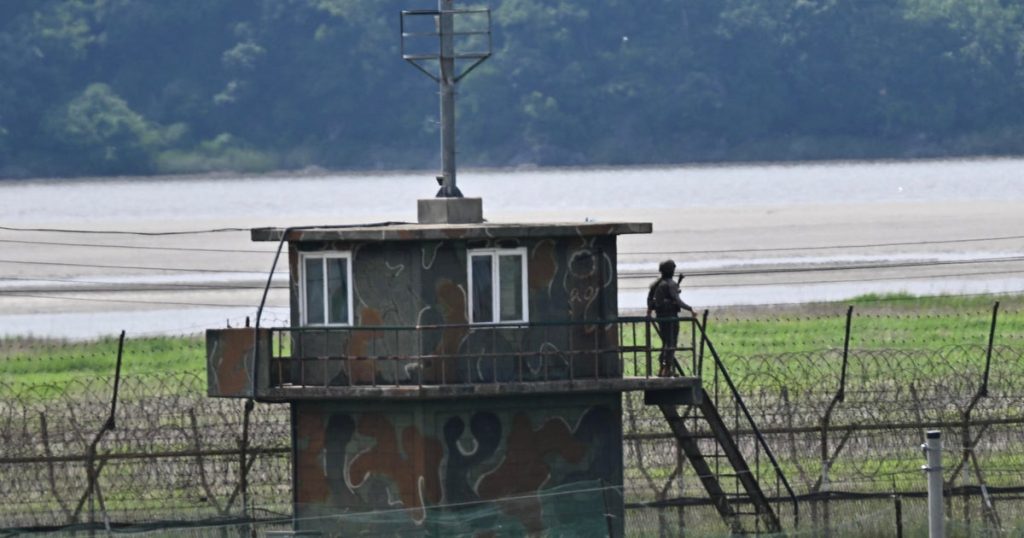A North Korean civilian successfully crossed the heavily fortified land border into South Korea and has been taken into custody by military officials. The incident occurred on Thursday within the Demilitarized Zone (DMZ), one of the most secure areas in the world, prompting a considerable response from South Korean military forces. The event underscores ongoing complexities in North-South relations and highlights the rare occurrences of defections across this perilous frontier.
| Article Subheadings |
|---|
| 1) Details of the Crossing |
| 2) Military Operations and Challenges |
| 3) Historical Context of Defections |
| 4) Political Reactions in South Korea |
| 5) Current Security Assessment |
Details of the Crossing
The North Korean individual, whose identity remains undisclosed, crossed the Military Demarcation Line (MDL) during the early hours of Thursday. Classified as a civilian, he traversed the DMZ, which serves as the de facto border between North and South Korea. The MDL runs through the center of this heavily fortified area, significantly mined and monitored, making such crossings exceptionally rare.
According to Seoul’s Joint Chiefs of Staff (JCS), the man was detected by military surveillance equipment between 3:00 and 4:00 AM local time. After identifying him near the MDL, South Korean forces launched an operation aimed at ensuring his safe custody. The swift, calculated actions reflect the heightened security protocols in place along this critical frontier.
Military Operations and Challenges
The retrieval mission involved a considerable mobilization of South Korean troops. The military’s task was complicated by the area’s dense vegetation and the ever-present risk of landmines, which pose a significant hazard in the DMZ. Initial surveillance confirmed that the individual remained largely stationary during the day, allowing the troops to strategize the safest approach for retrieval.
Typically, operations of this nature require meticulous planning, as the DMZ routes are difficult to navigate. The JCS reported that the recovery operation spanned approximately 20 hours, demonstrating the complexity involved. It was noted that under cover of darkness, troops approached the individual and successfully convinced him to follow them, emphasizing a compassionate approach in what is normally a high-stakes situation.
Historical Context of Defections
This incident is not an isolated one, although defections from North Korea have become markedly less frequent in recent years. For context, a North Korean soldier defected to the South by crossing the MDL in August of last year, and there have been other notable instances of defection, including one across the Yellow Sea. Historically, tens of thousands of North Koreans have fled to the South since the peninsula was partitioned by war in the 1950s.
Most defectors initially escape to neighboring China before making their way to South Korea via third countries. However, border crossings between North and South Korea have seen a steep decline since 2020, attributed to North Korea’s stringent border lockdowns related to the COVID-19 pandemic. This restrictive policy was not only about health concerns but was also purportedly accompanied by shoot-on-sight orders to deter any attempts to flee.
Political Reactions in South Korea
The political landscape in South Korea is intricately tied to the country’s approach toward North Korea. Currently, South Korea’s President, Lee Jae Myung, who assumed office last month, has promised a more reconciliatory approach toward Pyongyang compared to his predecessor, who favored a harder stance. President Lee emphasized the importance of dialogue and rational diplomacy, reflecting a shift in tone amid ongoing tensions on the Korean peninsula.
On Thursday, President Lee articulated his belief that “completely cutting off dialogue is really a foolish thing to do.” Such sentiments hint at a potential thaw in relations that could open doors for more discussions regarding defectors and broader issues of cooperation. This is crucial as the recent actions of North Korea, including the establishment of new tourist sites geared towards foreign visitors, indicate a desire for engagement on some fronts.
Current Security Assessment
Following the incident, South Korean military officials reported no unusual activities from the North Korean military, accentuating the controlled nature of the border for now. Officials are continuing to evaluate the situation and will conduct a thorough investigation into the circumstances surrounding the crossing.
When individuals defect to the South, they are typically transferred to South Korea’s intelligence agency for screening and further processing. This is in line with protocols aimed at understanding the motivations behind their departure and the broader implications for national security.
| No. | Key Points |
|---|---|
| 1 | A North Korean civilian crossed into South Korea, marking a rare defection. |
| 2 | The operation to secure the individual took about 20 hours and involved numerous troops. |
| 3 | Defections across the DMZ have significantly decreased in recent years. |
| 4 | Political reactions emphasize a more diplomatic approach towards North Korea. |
| 5 | No unusual activities from North Korea’s military have been detected following the incident. |
Summary
This recent defection underscores the ongoing complexities and evolving dynamics of North-South relations. Efforts to facilitate open dialogue and understanding may be crucial as political leadership shifts towards more constructive engagement. With the backdrop of historical defections and stringent border controls, the potential for future incidents remains a key concern for both nations.
Frequently Asked Questions
Question: What does the Military Demarcation Line (MDL) signify?
The MDL is the de facto border that separates North and South Korea, running through the heavily fortified Demilitarized Zone (DMZ).
Question: How do defectors usually escape North Korea?
Most defectors first flee to neighboring China before traveling through third countries to reach South Korea.
Question: What happens to North Korean defectors upon arrival in South Korea?
Upon arrival in South Korea, defectors are typically handed over to the intelligence agency for screening and further evaluation.


